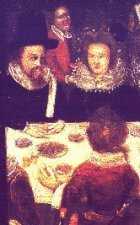 Dining: Service,
Utensils, & Manners
Dining: Service,
Utensils, & Manners
 Dining: Service,
Utensils, & Manners
Dining: Service,
Utensils, & MannersTraditional food and drink service may not be quite to modern sensibilities.
Usually one ordered beer or wine for the table and got a pitcher and a
mug, or perhaps just a great big mug, which was then shared around the
table. Pitchers were typically earthenware, while drinking vessels could
be pottery, pewter, leather, wooden or even glass. The typical English
drinking mug (the 'jack') was made of leather, waterproofed with pitch
or beeswax. Leather drinking vessels are considered barbaric on the continent
-- it seems to us that Englishmen drink out of their boots.
At the beginning of our century the table was usually quit spare. Serving dishes are set in the middle and diners usually eat what is closest to them, taking food out with their hands or sometimes with a serving fork or spoon. They usually have trenchers -- stale bread cut in a large rectangle to serve as a plate and keep the food off the tablecloth (and there is always a tablecloth -- see Furnishings). The juice- and sauce-soaked bread was usually given away after the meal to the poor. People often provided their own knives, but most utensils, drinking vessels, soup bowls, etc. are usually shared and there isn't much on the table at any given time. Even in a great house, a noble dinner guest would call for a servant to bring a drink, which would be served from a common goblet kept on the sideboard and wiped with a napkin between uses, and would share the soup bowl with their neighbor.
 In our day, at
the end of the century, individual plates are more common. In France, these
are typically pewter in an inn, and are round with a wide rim. In Italy
they are of fine painted earthenware, "like porcelain" according
to Montaigne, and in some parts of Germany and Switzerland "fine white
wood" is preferred. Wood (typically sycamore), seems to have been
the most common in England, although a modest country gentlemen would usually
have a "fair garnish of pewter." These wooden trenchers are flat
squares with two round depressions: a large, dish-shaped one where the
meal goes, and a small (fingertip size) one in the upper right corner for
salt.
In our day, at
the end of the century, individual plates are more common. In France, these
are typically pewter in an inn, and are round with a wide rim. In Italy
they are of fine painted earthenware, "like porcelain" according
to Montaigne, and in some parts of Germany and Switzerland "fine white
wood" is preferred. Wood (typically sycamore), seems to have been
the most common in England, although a modest country gentlemen would usually
have a "fair garnish of pewter." These wooden trenchers are flat
squares with two round depressions: a large, dish-shaped one where the
meal goes, and a small (fingertip size) one in the upper right corner for
salt.
Whether you get personal plates or not in the Poulet Gauche probably depends on the social status of you and your party. Generally speaking, we will bring one big platter for the table, a lot of bread, and expect people to go at it with spoons, knives, and fingers in the traditional way. We will bring spoons if you want them, but we expect that you probably have your own knife. While personal forks have been in common usage in Italy for 100 years, they haven't quite caught on in France yet -- although they're starting to in some upper class circles. England doesn't use them at all, except as novelties amongst the nobility. Here in the Poulet Gauche, M. du Lac thinks they are a ridiculous affectation -- he eats with his hands. Consequently, napkins are a must. You throw it over your left shoulder (or drape it over your left arm if your ruff gets in the way) and wipe your hands on it as needed.
We have salt if you ask for it (for a small fee - salt is still quite valuable), and do not leave the salt cellar (or "nef") on the table!
In this detail from Caravaggio's Christ at Emmaus (1590), it is clear the table has been set for a person of importance. The fruit basket and roast fowl indicate this. The painted maiolica pottery is very Italian. This is a good quality inn -- the table is covered with a Turkey rug. These were popular, but too valuable to put on the floor. Naturally, the rug is covered with a tablecloth for eating. There is one glass for all at the table, and a loaf of bread for each. Click on the detail to see the whole image in the WebMuseum.
For rudeness it is thy potage to sup
Or speak to any, his head in the cup.
They knife se be sharp to cut fair thy meat;
Thy mouth not too full when thou dost eat;
Not smacking thy lips, As commonly do hogs,
Nor gnawing the bones, As if were dogs;
Such rudeness abhor, Such beastliness fly,
At the table behave thy self mannerly ...
Pick not thy teeth at the table sitting,
Nor use at thy meat over much spitting;
this rudness of youth is to be abhorred;
thyself mannerly behave at the board.Francis Seager in School of Virtue and Book of Good Nurture, 1557
Modernized English
-a. newman & c. t. iannuzzo